#theories definately
Text
Holy fuck... Its Castlevania's anniversary!
Gods how did I not know??!
Well I guess while I'm here I might as well update you on a few things.
For one (obviously) I ain't dead! Atleast not yet. Lots of things have changed in my life since I last posted.
For one, I got a AA degree and am aiming for a bachelors in Art with a focus in 2d Animation. And yes, I want to work at Powerhouse Studios one day. Or IDW comics... either or is fine I think. So long as I get into the field.
As for why the Castlevania posts have gone dry. Its a combination of a few things.
A: At the time I didn't want to pirate the series. And Netflix was messing with my phone so I couldn't screenshot stuff directly from Netflix anymore so it kinda shot down the whole meme business.
B: By the time Netflix became too horrid for me to support Season 4 was like WAY too old for me to start posting stuff so at that point I just kinda didn't bother. I'd probably want to if there's support but this account has been dead for so long that I don't see it worth doing tbh.
C: I've been working on my art. As mentioned before I was busy with college and I'm trying to work on my portfolio. I have an Instagram if you're interested.
https://www.instagram.com/solslvr/ < -- Here's the link if you want to check me out.
Anyway enough about me. Happy Anniversary to Castlevania! And thank you guys for being around all those years ago. I might want to jump back onto the meme/theorizing train. Just let me get back into the groove of things.
#castlevania#blog update#been busy#sorry its been so long#happy anniversary castlevania#powerhouse animation#doitforthecringe#update#memes on the way maybe#theories definately#might want to change some things up#Just a thought
3 notes
·
View notes
Text
I am actually. I am so emotional over the Salazar parents and I need to share this to tumblr too.
A lot of stories where the MC is adopted I feel. Either dismiss the biological parents and the impact they have on the kid's life, or makes them evil and abusive, framing the loss of the bio parents as a good thing, or at least something we shouldn't think about just look at this new family.
But Genrex doesn't do that. From the start, Rex wanted to find out more about his parents - it's one of his primary character motivations, next to helping people. He loves them, even though he doesn't know them.
And the more he finds out about them, the more he realizes they loved him. Rylander is consumed by guilt but as Rex's first connection to his pre-Event life, the first thing he does is hug him. And when he tells Rex about his parents, the two things Rex knows is that 1) they were scientists, and 2) that when he was in danger, they were desperate enough to use their secret, experimental technology to save him. Technology built from their desire to help the world, to save countless lives and end countless suffering.
And then. When he finds out that they were dead, he doesn't stop caring. It'd be so easy, too, to tie it up there - his parents were good people, he got his answer about them, the end. But they don't. He doesn't. Because the show is saying once again that they are his parents. He still calls them mom and dad, even as the show makes it clear Holiday and Six adopted Rex as their son. Even as the show even parallels Six and One with Rex and Six (and I will talk about that more later if I don't forget, trust me), to really drive home how much they're family. Rex even says he considers the two of them family, and later that he considers Noah, Claire and Annie family.
He has new family, the show tells us, but his old family still matters to him. He's upset that he never has the chance to meet his parents, that everything he hears about them, about his time with them, is secondhand knowledge. It tells us clearly that not only does Rex still love them, but that he still wants to know them. And everything we find out about them reinforces the love that they had for each other.
We see Abuela and the family in Mexico, who connect him to his birth family and tell him that he was so loved back then, and still is now. We see their office in Abysus through Rex's eyes. The picture of him and his dad on his desk. The drawing Rex drew, proudly pinned to the wall.
We see it in the familiarity of the drawing. That that robot, that build, was what Rex created when he was lost and scared and alone - that it was made to keep him safe. That it first appeared in his mind in a place he felt safe.
The show says, tenderly and softly, that the love is still there. That the fact these people died was nothing but a tragedy, that their love is a big part of what made Rex who he is today - that every molecule in his body is filled with their final gift to him. That every time he cures someone, every time he uses a build, every time he makes a machine - we see the love that they had for him.
And the way he quietly absorbs his father's face. The way he freezes and whispers "Mamá?" when he finds out Zag-Rs has their mother's voice. The fact that she even has her voice as a testament to Caesar's love, too - that it was meant to bring comfort and safety. The way Rex yells at Caesar when he finds out they have a family property, a connection to their past, the way he fights to protect it.
And, none of this takes away still from Six and Holiday being Rex's family too. None of this removes the work either set of parents did for him, the love either set has - the show says that it was unfair that the Salazar parents were lost. That Six and Holiday are not replacements, that they still love him as parents but play different roles in his life. They can not, and have no desire to, replace the Salazars. But Rex needs parents, he needs protectors, and so they will do what they can for him - at first out of necessity, to keep this kid they barely know safe, but then out of love. They aren't replacing what was lost, but are doing their best to do what Rex's bio parents would do. And they do mess up in it - they mess up in ways Rex's bio parents might not have. Six is clearly bad with showing affection, affection we saw the Salazars give Rex so easily, and Holiday is overworked and stressed constantly, sometimes breaking under the pressure and snapping at Rex and Six, things we never saw the Salazars do.
It's just. It's about how sometimes things will not be the same. They will be different. That doesn't mean the people you lost aren't still with you.
#This is also. Why I dislike the 'Rex was secretly made for the nanite experiments the accident was a lie' theory so much#Bc it assigns malice where the show says over and over again there was only love.#That this was only ever a tragedy of good people whose good intentions were manipulated and twisted.#And I think giving them something shitty to have done in the past especially goes against the message of the show's perspective on adoption#The family we choose is not always stronger than the family we are born to. Sometimes they are equal in different ways.#Rex's bio parents are gone but not replaced. They have also shaped who he is#Six and Holiday are just picking up where they left off. Because they have to.#Also I don't like the theory that Rex's parents are EVOs somewhere bc I think it diminishes the impact of the tragedy too.#I get. Wanting them to have a happy ending. But I think it's important to realize that this is the closest they can have to a happy ending.#Some things cannot be replaced. Or fixed. Sometimes life takes what we love and what loves us. And that is okay.#It is okay to be upset at that and it is okay to never fully move on.#'What about Caesar?' I have. Another post's worth of thoughts about him.#But I think he's also a character who is defined more by Rex by their relation and defined by the story by his guilt#I think he is the closest thing Rex has to a shitty bio family member and he is shitty in plenty of ways#But he's also a parallel to Rex in a lot of ways. He fails where Rex succeeds bc of it.#generator rex#genrex#Anyways. Sorry for the big post.
78 notes
·
View notes
Note
🍦What’s the Tsumugi salmon mode ending trivia? (<- brain chemistry unironically changed because of Tsumugi)
Honestly it's less an Easter Egg, per say, and more, HEY HOW DO MORE PEOPLE NOT TALK ABOUT IT IT'S WILD



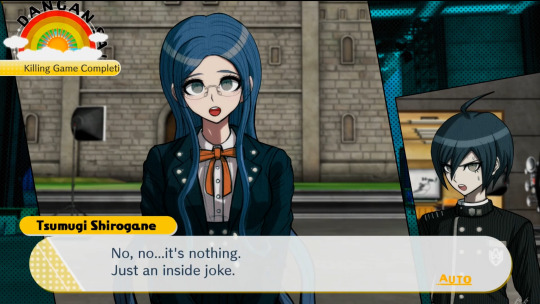

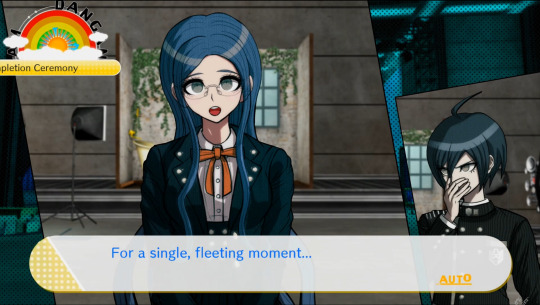


And after some more 'normal' dialogue, at the very end...

LIKE HELLO??? It's completely out of left field and the only moment like this in all the post game stuff. Super eerie there is something sooo wrong with her for this <3
#i actually find it really interesting shuichi describes the glowy eyes as the light fading#i mean they have more defined eye bags than her normal sprites so it makes sense#it just really highlights how much of tsumugi's heart and soul she put into this in a very grim manner#hey girl!!! you destroyed your entire existence for fiction!!#was it worth it?#also saw a theory that the reason she says this is because the bonus content was filmed first#hence 'i look forward to working with you'#tsumugi shirogane#shuichi saihara#ndrv3#new danganronpa v3 killing harmony#danganronpa
56 notes
·
View notes
Text
The legacy of a craftsman
The amount of space that Blade and Yingxing takes up in my brain is feeling increasingly concerning. I can't stop thinking about them...
Like now that it's finally not just a leak, has anyone else read Baiheng's Travelogues about the Xianzhou Zhuming? Featuring Baby Yingxing??
Literally the second one devastates me emotionally I can't even explain it. Yingxing being so discouraged by the masters on the Zhuming who are long life species degrading him to the point he, a child, talks about how he'll probably never live to see his parents be avenged after what the Borisin did???
THAT HURTS
And God I can't even,
GOD if I could properly put into words the fact that Yingxing is a craftsman being so important to his character and identity and how Hoyoverse making a point to specify the injuries that occurred to his hands in whatever gray transition period happened between Yingxing and Blade that made him unable to craft weapons again is such a tragic visual to completely severe the two identities, that is ALL you would hear from me ever.
Because see the thing about Yingxing being a craftsman is that all stems from a goal in his past. As a child his home planet was taken over and turned into a weapons nursery, his parents were slaughtered, it became his goal as a child to create technology and weapons for the Cloud Knights to fight terrifying monsters like the Borisin. And that goal ended up defining the rest of his life, going on to become the Legendary Furnace Master on the Xianzhoh Luofu. That ended up becoming part of his legacy with the HCQ. It's clear how heavily important that part of his identity is defining not just his time in the HCQ but his time on the Zhuming, and everything that occurred to him as a child to lead him to that exact goal. His whole past.
And for Hoyoverse to specify how Blade's hands have been hurt to the point of no longer being dexterous, to the point of no longer being able to forge a weapon ever again, as those injuries cannot be healed by whatever Abundance shit he has going on since they likely happened before he became immortal(?). It just... it is devastating. It's something used as a way to severely separate the two of them so people realize they are two different identities on top of Blade already making it clear he sees Yingxing as dead. The way that they went about his hands... it's not merely that he relinquished that identity, which would be him no longer making weapons out of choice. It is that he can't connect to that identity anymore, the change he went through was far too severe. Thus he cannot make weapons anymore, he has been stripped of any ability to.
I'll make like a better post explaining this later, but I believe the use of Yingxing status as a craftsman and Blade's inability after he was revived TO craft anything is fundamentally used as a tie to the separate of identity between them and it's so well used and so tragically used.
Because again, it is not that he lost Yingxing's passion for it or decided on a different path. It is a wall that separates him from being able to do what Yingxing did in the past just as he is unable to connect to the identity his body held before death.
#Yingxing#Hsr blade#Hsr#Honkai star rail#High cloud quintet#Baiheng#Hsr theory#Like guys do you hear me#DO YOH UNDERTSAND ME#Blades whole thing with identity fucking hurts#The transition between them is devastating to me#Also let's talk about the fact that Dan Feng to Dan Heng and Yingxing to Blade are identity progressions in the opposite direction#Df to Dh: Lack of individual identity to a firm sense of self#Yx to Blade: A defined personal identity to a completely loss of self as well as self dehumanization#It hurts#If truly everything with the sin relates to Dan Feng in some way having made Yingxing immortal#That means that apart of the acts that would go on to free Dan Feng and allow his next incarnation his own free identity#Includes an act that would completely strip Yingxing of his own#THATS SO FUCKING TRAGIC...#Anyways#I feel crazy right now
124 notes
·
View notes
Text
Socialization theory with regards to trans people might have been an interesting conversation if people hadn't ever used it to mean, "you will always be [gender] no matter what, and my assumptions about how you were socialized mean more and are more true than whatever you say you went through as a child. Your account of your life is untrustworthy because it doesn't align with what I say is [male/female] socialization."
I'm not sure this theory wouldn't have been picked up by transphobes, but it's infuriating how you can't even discuss your thoughts about your own transness or growing up trans without being called a liar.
#trans#transgender#lgbt#lgbtq#ftm#mtf#nonbinary#transphobia#transphobia tw#like people use socialization to mean ONE thing depending on what is the topic...#...like the idea that 'female socialization' only looks like one way (which is usually straight/white/gender-conforming/western ect ect)...#...people don't like nuance because it usually takes more effort...#...what is noticed are patterns but patterns do not a defining characteristic make#honestly i don't even fully believe that socialization theory would even be adequate even if transphobes didn't jump all over it#but it would have been an interesting discussion nonetheless...#...like the discussion doesn't have to be ~divine~ and 100000% true so long as it isn't forced onto people
132 notes
·
View notes
Text
I found the spell Circle of Death while looking at Arcanums for kicks and I need to ask: does ANYONE use this in regular play and if so, are your PCs on trial for war crimes?
Circle of Death
6th-level necromancy
Casting Time: 1 action
Range: 150 feet
Components: V, S, M (the powder of a crushed black pearl worth at least 500 gp)
Duration: Instantaneous
A sphere of negative energy ripples out in a 60-foot-radius sphere from a point within range. Each creature in that area must make a Constitution saving throw. A target takes 8d6 necrotic damage on a failed save, or half as much damage on a successful one.
#HOW ARE YOU AVOIDING FRIENDLY FIRE WITH THAT LARGE OF AN AOE RADIUS. HOLY HELL.#to be clear. this was for an active war criminal of a character lmfao.#will they have an arcanum level-wise? dunno yet. bUT.#this is like. a literal war crime tho lmfao.#contrary to popular belief there ARE theories of universal war crimes and I am pretty sure this qualifies.#(this is also why I get annoyed at 'um there's no geneva convention in exandria lol' takes.#do you think that's the only fucking defined usage of legal limitations on law. and have you ever opened a history book or.)#ANYWAY I DIGRESS#dungeons and dragons
121 notes
·
View notes
Text
Mike is Going to “Die” in S5
In season 5, we’re going to be presented with a scenario in which Mike is going to have a fake death like Hopper did, or everyone is going to believe he’s dead like they did with Will in season 1.
There are two major points to this; Mike’s seasonal death tags and his pattern of predicting future events through DND.
Seasonal Death Tags
I’m only going to cover the most obvious death tags that aren’t really up for interpretation and keep it to the point.
Season 1
Mike jumps off a cliff, prepared to die. He’s almost immediately saved by El.

Season 2
Mike is caught by the vines that almost killed Hopper. He’s saved by Steve, but only after a cut off in which we see El face the mother gate and watch the Mind Flayer turn its attention to her. definitely not a coincidence
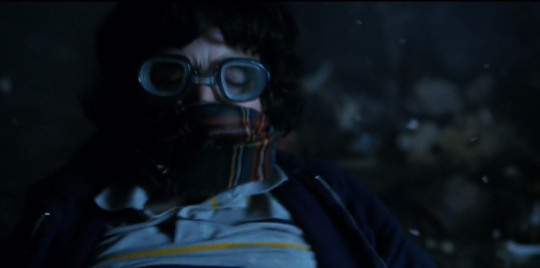

Season 3
- Mike talks about sacrificing himself and Lucas to end Will’s campaign. His character is never saved and that’s the end of the campaign.
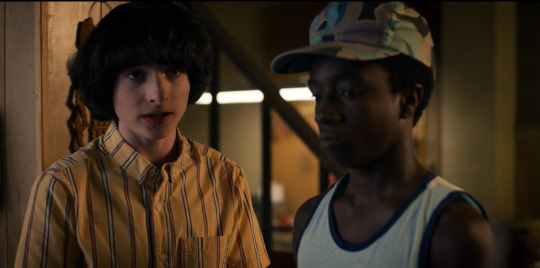
- Mike, in an attempt to save El, draws Billy’s attention. Billy was going to kill El, and now his intent to kill is turned on Mike. He’s saved by El.
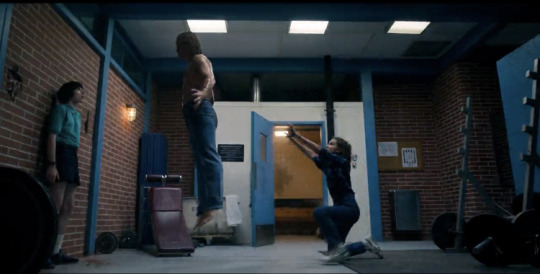
Season 4
- In the opening DND game, Mike’s character is zeroed out. Dead. The game ends with a saving throw from Erica, but Mike’s character doesn’t come back.
- Mike is referred to, directly, as Romeo and marked with Romeo’s last name; Montague.

“Surf’s up, Romeo”
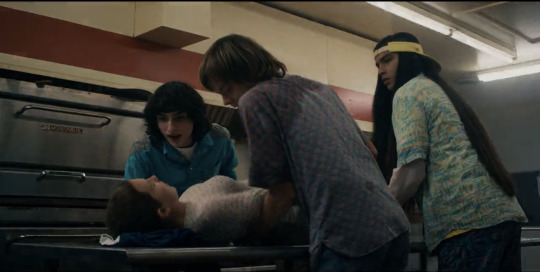
‘Montague’ is written on the oven left of Mike’s head.
Mike’s Predictions Through DND
I can’t use as many images since I’m on mobile, sorry about that.
Mike predicts an occurrence in every season through DND.
Season 1
In the first ever scene of the kids, Mike’s campaign predicts that the Demogorgon will attack Will. As far as we know, that’s what happened because that’s what Will and everyone else believe happened.
Season 2
This prediction is actually made at the end of season 1, but it doesn’t apply till season 2.
When Mike wraps up his campaign, the other party members start questioning him about unfinished plotlines, one of which is about “the cave with the weird flowers in it.” That’s something that appears in season 2; the cave tunnels with weird flowers that spit toxins into the air. It never truly gets explained what those tunnels actually are, either. They’re the only UD related thing that never gets an actual name.
Season 3
When Mike plays in Will’s campaign, he predicts one major event: Hopper’s death.
He describes killing the Juju zombies by lighting the chambers on fire and sacrificing himself to save the Khuisar. According to what everyone else hears, Hopper saved townspeople from the mall fire and died doing so. What we know is that Hopper sacrificed himself to close the gate and save all of Hawkins. Mike’s story intertwines these two versions of Hopper’s death story.
Knowing that, we can assume that whatever Mike does in the opening DND game of season 4 is a prediction for future plot events.
What happens to Mike’s character? He dies. I don’t think this is meant to imply the death of any other character for two reasons; one being the number of death tags he’s received that haven’t led anywhere and the other being the figurines shown to describe Mike’s character’s death.

We’re shown a Paladin on the left, so we know this is directly tied to Mike.
Mike’s character is the one that dies, so that would imply Mike is going to actually die. Or it would, if Eddie didn’t tip over the other figurine.

Eddie knocks over the figure which, dare I say, looks like a ‘dark sorcerer’. Mike’s Paladin doesn’t actually go down, despite his character supposedly dying. Mike, as he’s represented on the board, doesn’t die. It’s only believed by everyone else that he does.
Another thing is that we aren’t shown what Mike actually rolled. This is a direct contrast to the other dice roll scenes we get from Dustin and Erica.
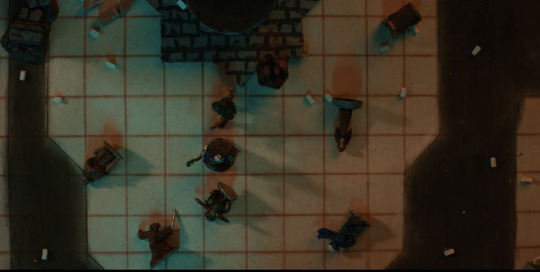
Dustin’s roll, 11, predicted that El wouldn’t be enough to beat Vecna. Erica’s roll, 20, beats Vecna. What that number means will most likely be shown in season 5 when Vecna finally goes down.
If these rolls are prediction shots, then why aren’t we allowed to see what number Mike rolled?
Vecna ‘Killing’ Mike
I think the most obvious answer as to who will be the one ‘killing’ Mike is gonna be Vecna. I have a whole post about that here.
With all the evidence in that post about why Mike is an ideal target for Vecna, I also wanted to add here that Mike must have rolled a low number in order to get his character killed. The Duffers never use plot irrelevant numbers, so the only low number they could use that they would want to keep secret from the viewer is One.
Mike is so fucking dead.
#mike hostage theory#kinda?#should i give this a gate name#is it even a gate???#i actually have no clue what a gate is defined by in the byler fandom#mike wheeler#byler#my theories
668 notes
·
View notes
Text
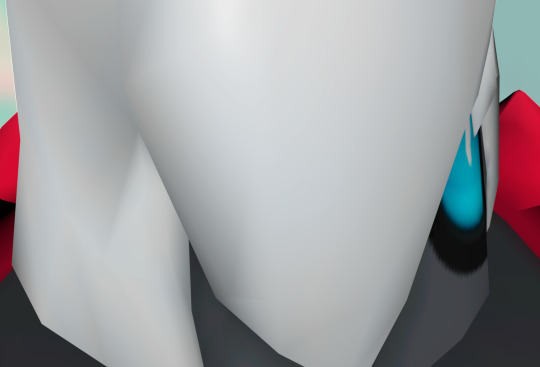

#further away angle under the cut 'cause i couldn't decide which one to use#this guy is a bit of a difficult one to ffp it seems. he doesn't really have a super defined… Face. just kinda. An Eye#didn't everyone have like… theories about how the pmd sky darkrai was shiny? but then it turned out to like not be true and#it was just the weird colors in pmd sky's talksprites. which are pretty weird sometimes#i dunno. insert theory about how jirachi caused darkrai to end the world or something because of bidoof's wish#darkrai
74 notes
·
View notes
Note
Now I'm curious, I need to know how many bloodlines are dead, like Bluestar's is just tragic
WELL, it's a question without a straight answer. Bluestar's bloodline isn't "dead" but it's not "alive" either. It's a secret third thing. I'm calling it Schrodinger's Bloodline in my head.
In RiverClan, ShadowClan, and WindClan, there's a "missing generation" gap in-between TPB and TNP where a ton of "Orphan Warriors" suddenly appear. For a series that's hypothetically supposed to have legacy as a major theme, in practice, only ThunderClan is allowed to remember their grandparents lmao. So that means that Reedwhisker COULD have had children... but we don't know.
The only direct lines that cross that Missing Generation Gap we have tracked outside of Thunder and Sky are;
The Palebird Line (Tallstar, Onestar, Heathertail)
The Hickorynose Line (Deadfoot, Sorrelshine, Whitetail. Completely absorbed by the Palebird line)
The Scorchwind Line (Rowanstar)
So, any other non-ThunderClan family tree that you can think of is "gone", or more accurately, in the Schrodinger's Bloodline box. Yellowfang's entire family is gone. Blackstar's family is gone. Crookedstar's family is gone.
The TRULY DEAD lines in Warrior Cats are within SkyClan and ThunderClan. And by the way it's INSANE how inbred SkyClan, The Kittypet Guys, became in less than 3 generations. It's AWFUL.
This is because the writers have a really bad habit of "quantity over quality" in terms of which cats they choose to "breed." They'll pick "super parents" in a generation, essentially, have them produce 4 - 7 kittens, and then choose 3 of them to become the parents of the next generation. Clovertail, Snowbird, Robinwing, Swiftbreeze... and basically they irrevocably fuck up the genetic diversity completely.
(and then they forget they did it and ignore their own shitty tree, because if they didn't, they would completely prevent shipping within several generations. Dustpelt being Ferncloud's uncle, Spottedleaf being Tigerclaw's aunt, Brightheart and Swiftpaw being 1st cousins, Thrushpelt being Thistleclaw's brother, all things the writers completely forget... if you treat canon like scripture, you'll eat yourself alive.)
But anyway, tangents aside, lines that are entirely dead within ThunderClan;
Thrushpelt, Dappletail. This little branch is dead.
Sunstar's line is dead
One-Eye's kits, Runningwind and Mousefur, had none of their own
Doestar's line is dead
Not to mention the orphan warriors. Hollypelt, Rockfall, Weedwhisker...
So, in a nutshell, the list of "living" lines is shorter than the list of 'dead' lines. This is because the lines in most side clans aren't tracked, and in Thunder and Sky, bloodlines bunch up through genetic bottlenecks like Adderswift/Robinfuzzy/Clovertail.
#bone babble#warrior cats family tree#I see folks talking about how they don't really care if there's orphan warriors but like... I do#Because what I LIKE about warriors is its unique premise#Following characters that grow up quickly and following several generations#It doesn't use this concept very well (and I've done the homework to prove it) but in theory?#there is nothing else like it.#There's no other series like WC#And I think they've dropped the ball in not defining some Families/Nests/Crests what have you and talking about their unique problems#Something you can see me trying to fix with Whitedragon and the Houndstar Line#The Firekin shouldn't be the only family out here who's allowed to talk about legacy!!#And hell even the Tigerkin have gotten over it aside from offhanded laughter at Leafstar for a social faux pas
95 notes
·
View notes
Text
so interestingly enough, some ppl have been pointing out that maybe miles42 is slightly older than 1610 miles? and i was like "yeah maybe" but looking at miles42's face more and more lately i'm... i'm starting to see it? :o
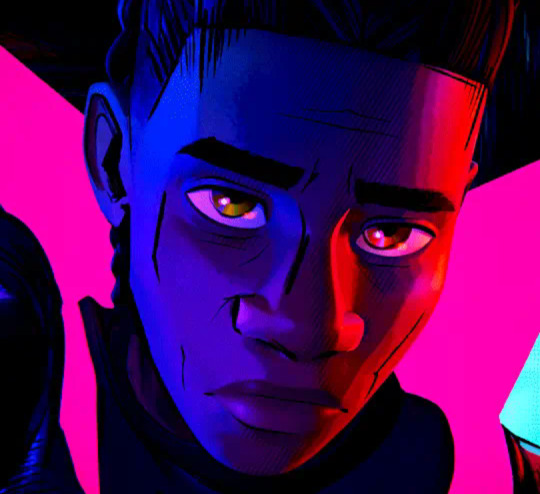
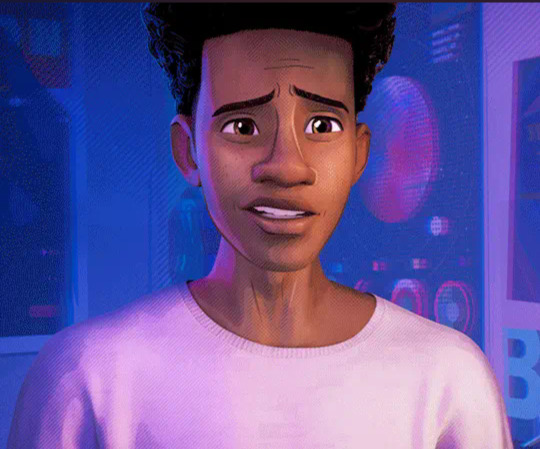
like if you just compare the jawlines and cheeks, it actually looks like 42 lost some more of the baby fat 1610 still has
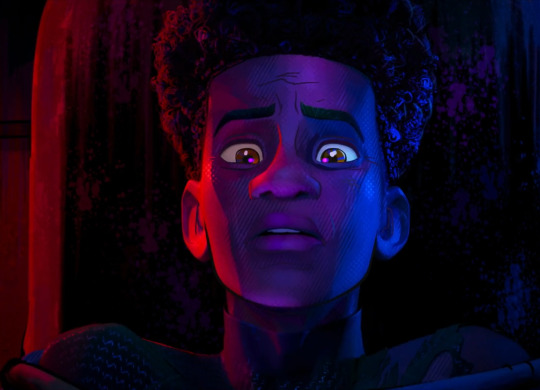
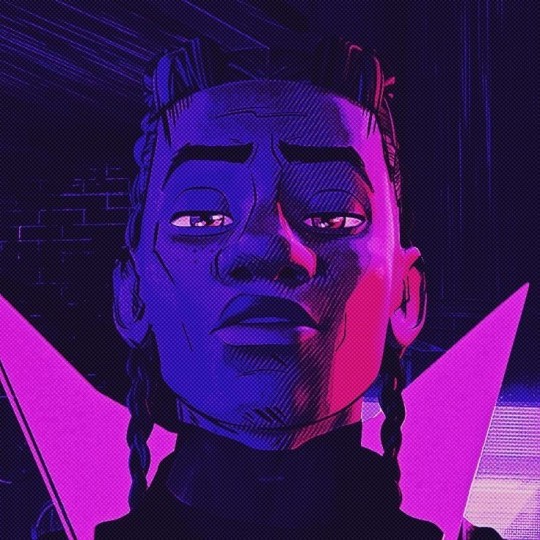
and even without the Dramatic Ink Lines, 42 still looks like he's older than 1610 by at least a little! he has slightly more defined cheekbones imo

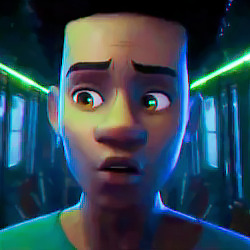
its kinda hard to tell with limited camera angles and weird lighting tho. there's also the possibility that bc 42 lives in a household that's clearly struggling financially, one could argue he just happens to be not as well fed as 1610
not only that but the different murals they have of aaron in 1610 and jeff in 42 are also completely different. i've heard ppl pointing out that jeff's mural looked more worn out but actually.... the one thing that strikes me is how simplistic jeff's mural is.


almost as if someone younger than 1610 made it.... someone who lost their father at a younger age and started growing out their hair to braid it around that same time. someone who developed an effective routine with their uncle also around that time, and who's had it down pat by the time 1610 appeared in their universe...
but what do yall think?
#miles g morales#spiderverse#miles morales#its kinda hard to tell but i can see it!#plus 42's hair is def longer than 1610's and you could argue that he started his hair growth earlier than 1610#but idk... braids like that dont happen overnight#and i also subscribe to the theory that 42's dad died when he was much younger as well#bc he and aaron have a much more defined routine and dynamic#than 1 year would ever allow#42 being older than 1610 just might really be a possibility!!!!! 👁#and them not even sharing the same voice actor too?#42's VA sounds slightly older than 1610's too#i just went back and replayed the ending in atsv and really listened to their voices this time#and 42's voice sounds slightly deeper than 1610 even when he was out of the mask and being conversational#you can def hear it in his “why would i do that?” line#omfg idk why im so excited about this possibility LOL#42 big brother to 1610 maybe???? 🥺🥺🥺#@ spiderverse writers PLEASE 🙏🏼
36 notes
·
View notes
Text
Is Klaus' legal logic of The Bad Beginning sensible?
* Joint Theory: @unfortunatetheorist with @snicketstrange *
Klaus's speech to the audience during the events of The Bad Beginning had a carefully thought-out structure, anchored in deeply rooted legal, but more so ethical, principles. In defence of his sister, who was forced into a marriage, Klaus appears to have adopted a multifaceted approach to challenge the marriage's validity.
Firstly, John Locke.
John Locke was one of the first people to suggest that humans have natural rights. He also wrote a book about this called the 'Two Treatises of Government'.
Klaus likely invoked John Locke's arguments on natural rights to contend that the marriage was not consensual and, therefore, violated his sister's fundamental rights to life and liberty. The idea that the bride must sign "with her own hand" is interpreted here not literally, but as an indicator of action "of her own free will," supported by Locke's principles.
Secondly, Thurgood Marshall.
Thurgood Marshall was the first black Supreme Court Justice of the USA, who fought for the rights of black citizens against Jim Crow's extremely racist ideologies.
His defence of the 14th Amendment may have been used by Klaus to argue that, in cases of ambiguity or doubt, the judge's decision should lean towards protecting the more vulnerable party. This point strengthens the point that, if there is doubt about the how valid Violet's consent is, the legal and ethical obligation is to invalidate the marriage. The 14th Amendment to the United States Constitution is crucial for establishing constitutional rights and consists of various clauses. The most relevant for Klaus's case is probably the Equal Protection Clause, which states that no state may "deny to any person within its jurisdiction the equal protection of the laws." Klaus may have leaned especially on this clause to argue that, in situations of uncertainty, i.e. his sister's forced marriage, the interpretation/application of the law should be done in a manner that protects (in this case) Violet. This would align with the principles of the 14th Amendment, using it for equal protection under the law to invalidate the marriage and protect his sister's rights.
Third, Ida B. Wells.
Ida B. Wells was, similar to Thurgood Marshall, an early civil rights campaigner, who campaigned for anti-lynching (a word which here means, opposing the brutally violent act known as lynching).
Klaus likely drew inspiration from Ida B. Wells to assert that everyone has the right to be heard and protected by authorities, regardless of their age or origin. This argument would serve to legitimize his own standing as his sister's defender in court, neutralizing any potential prejudice against him for being a child or, perhaps, belonging to a minority (he and his sisters are Jewish).
Moreover, the presence of a judge at the ceremony should not be viewed as merely a formality, but a control mechanism to ensure mutual consent, something that resonates strongly with Locke and Marshall's ideals about the role of government and law. Thus, if either of the spouses gave any evidence to the judge that the marriage was conducted under duress, the judge would be obligated to invalidate the marriage. Violet's chosen signal was to sign the document with her left hand instead of her right hand. As the judge explained, the marriage could be invalidated due to this discreet yet appropriate signal.
Lastly, the word "apocryphal" that Lemony uses to describe Klaus's argument suggests a non-conventional but insightful interpretation of the law, something that seems to echo Marshall's "doubtful insights" and Wells' "moral conviction." Instead of resorting to literalism ('literally' - with her own hand, i.e. Violet's dominant hand), Klaus's argument was much deeper and grounded, touching on the very essence of what legislation and the role of judges are. That's why Justice Strauss was so fascinated by the young boy's speech.
In summary, the historical references evidence that Klaus wove these diverse elements into a cohesive and compelling argument, utilising the legacy of these thinkers to question and, ideally, invalidate his sister Violet's forced marriage.
¬ Th3r3534rch1ngr4ph & @snicketstrange,
Unfortunate Theorists/Snicketologists
#asoue#asoue netflix#theory#vfd#a series of unfortunate events#lemony snicket#snicketverse#count olaf#thurgood marshall#ida b wells#john locke#legally snicket#Very Fatiguing Definition(s)#'My brother's defining words again' ¬ Kit Snicket
76 notes
·
View notes
Text
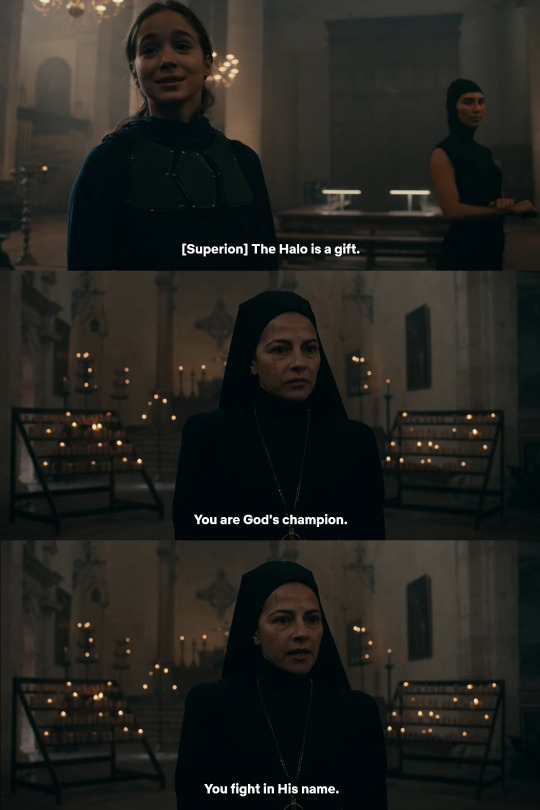

If we are to take a deep dive, it is best to assure the place we're leaping from is stable, so let's do that by starting with the obvious.
The subject in both of these sentences is the same: the Halo. Both of these characters have borne it. Both sentences present the same grammatical structure and answer directly to one another despite the distance in time and space between one and the other's utterances. To Ava, the receiver of these conflicting messages, both claims prove themselves to be ultimately true, for the Halo acts as a gift, in granting her a second chance at a life she never had, and also as a burden, as it imposes on her responsibilities and demands of her sacrifices she would otherwise have never known.
But the show itself openly invites us to dig deeper, so we should not be contented with the obvious alone.
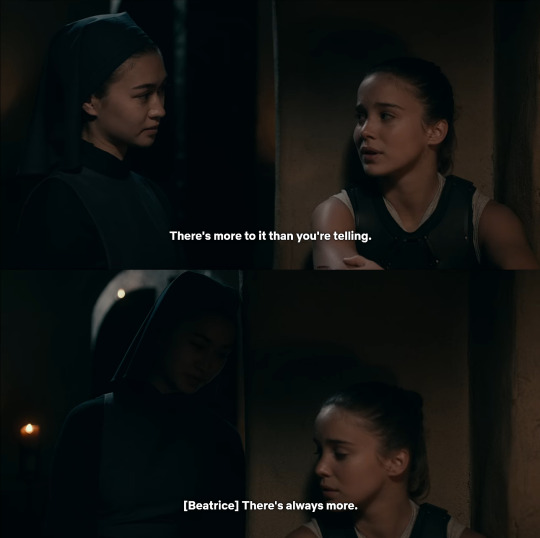
If there is always more, then we must peel back the surface and peek at what is underneath if we are to grasp at least a fraction of the functioning of Warrior Nun in different levels—be it in small scale, pertaining to the characters themselves, or be it in large scale, including how all of it relates to us as viewers in the end.
These two moments of season one are but a fragment of the show’s comprehensive universe, but we will examine them closely to see just how much meaning we can find in them, deceptively simple as they seem.
As mentioned above, the grammatical structure of both sentences is shared between them: “the [subject] is a [noun]”. This could lead to some sort of direct description we associate with the act of definition, of explaining what something is, as in “the pope is a man” or, to use the same reference as Mother Superion and Shannon do, “the Halo is an object”. In fact, had this been the case, we would have been closer to Ava’s own conclusion of the Halo being “a hunk of magic metal embedded in [her] back”, as this is a characteristic anyone could ascribe to it upon examination.
Yet the words used by both former warrior nuns are “gift” and “burden”. If they describe the Halo, then it is not in terms derived from objectively observable traits it possesses (such as it being made of metal), but in a wholly subjective manner. When Mother Superion and Shannon say the Halo is this or that, both imply that it is this or that as relates to themselves. In relaying what the Halo supposedly “is” to Ava, they pre-interpret it for her, infusing it with their own points of view—their beliefs. What they say of the Halo is much more a reflection of who they are than anything the Halo in itself could be.
A) The gift
A gift is, as we know, a present. It presupposes a giver and a receiver, as well as some degree of gratitude on the part of the latter, even if justified by politeness alone.
Mother Superion, embodying the authority of the Catholic church, framed by candles and an altar behind her while making use of short, straightforward affirmations, does not need to clearly state who occupies these positions: we can safely infer that the giver here is God and the beneficiary of this divine benevolence is Ava. A definiteness is patent in the sentences that follow—here is the power of the institution at work, for if Mother Superion starts out by “defining” the Halo, now she defines Ava through it. An inversion takes place, as the woman allows the object to define the woman (as “God’s champion” who “fights in His name”) rather than the other way around. The church, the Halo construct Ava as a subject, subjecting her to certain ideas of what she should be. She is the warrior nun despite having no say in it, not being a warrior and much less a nun.
At first sight, it wouldn’t make sense to interact with Ava in these terms, especially if, by this scene, Mother Superion has already read her file. It wouldn’t be difficult to deduce how expressions crafted with religious colours might impact an audience that does not show any religious proclivities. Furthermore, the tradition of rhetoric has always taught that speakers ought to adapt to their listeners if they wish to get their point across, so either Mother Superion is incompetent at communication, lacking sensibility and skills, or she is making a calculated move—one that is fully supported by her hierarchical position. After all, superiors seldom need to rationally convince their subordinates of doing something given how the latter are compelled instead by power dynamics to get in line—or else.
The strategy doesn’t really work on Ava.
In semiotic terms, we could even argue that there is something confusing happening in this scene—a narrative phase of manipulation (wherein someone tries to get someone else to accept and do something), we could say that it contains hints of both seduction (a positive commentary on the interlocutor—it’s not just about anyone who can be god’s champion, so this is a positive distinction) and intimidation (the threat of negative consequences if the interlocutor doesn’t comply—there is an implied order in the sequence, meaning Ava cannot refuse to be “God’s champion”). Ava might not share in this world-view, but it is what the church and its followers propose: a gift from God is a positive value. Being chosen by God to do something, even fighting and possibly dying in the process, is a positive value. Lilith is standing right there beside them and, at this point, she would surely agree and see nothing of this exchange in a negative light.
Yet Ava isn’t a nun and indeed she does not perceive any of these “honours” as being desirable. Mother Superion’s stance, the image she presents of herself as a strict nun herself when Ava has been mistreated by them all her life, equally gives her no reason to be persuaded, much on the contrary.
The manipulation fails. Ava is told God gave her the gift of life… And that now she is to endanger and potentially lose that very same life as some sort of gesture of gratitude. The logic is unimpressive at best and frankly absurd at worst.
Within the framework of the church, however, it makes perfect sense. Misattributed and misconstrued as it might be, the motto of credo quia absurdum is still pertinent: “I believe because it is absurd”. That a god should grant life only to claim it back through violence is perfectly acceptable if one believes in this god’s unquestionable authority rather than seeing this demand as something ridiculous or cruel.
The very concepts of God, service, battle, duty, blessings only make sense to the faithful, something Ava isn’t. She’s just a puny little individual resisting the pressures brought upon her by a powerful institution.
She and Mother Superion are only speaking over one another, not really having a conversation; Ava doesn’t care to listen to what the church has to say, she doesn’t take it seriously, and the church likewise does not take her individuality, her person into consideration.
However, we would do well to remember that Mother Superion is not simply a mouthpiece for the church—she is also Suzanne, lowly little individual with lowly individual desires and resentment just as Ava.
And, regardless of the effacement of self that monastic as well as military institutions enforce on their members, just as Ava’s subjectivity isn’t neatly negated by direct statements in line with reigning dogma, Suzanne’s own subjectivity also seeps through her words and attitudes. If not blatantly, at the very least there is a remarkable struggle taking place within her, suggested by her use of language as well as her demeanour.
The Halo, after all, defines her as well.
If bearing it is the greatest honour, a mark of God’s favour, if it defines a person, then losing it has an equal power of definition. The distinction it confers on someone is inescapable, for good or ill, and either one dies gloriously as “God’s champion” or one survives it, survives its removal, and is deemed rejected and unworthy by this so magnanimous God. The Halo soaks up all of the positive value ascribed to it—meaning those who lack it adopt a negative one in contrast, be it Suzanne who had it and lost it or even Lilith, who should’ve had it and didn’t.
Still it is considered “a gift”, something given by God… One could say it is a form of grace.
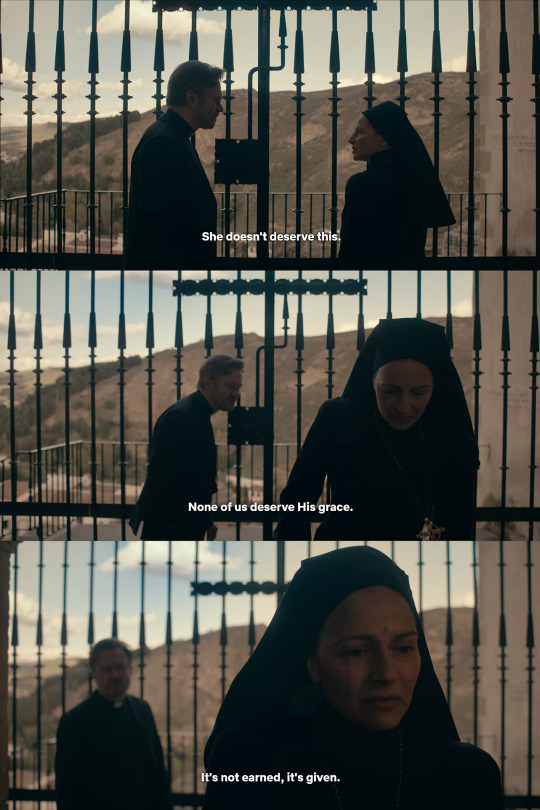
Suzanne’s noun and Vincent’s verb have the same origin, of course, the same stem. Despite the argument between them in this other scene, ultimately there is agreement between the two of them judging by their choice of vocabulary and Mother Superion’s reaction immediately afterwards. If this were not true in some degree, there would have been little need for Mother Superion to correct Ava in the first place, for Ava calls the Halo “a hunk of magic metal”, yes, but she also refers to it as “top prize”, as a reward—which, unlike “gifts”, are meant to be earned, to use Vincent’s comparison. There is a mixture of concepts here.
Without wanting to overcomplicate this text, let us say that ideology is a certain way of understanding the world and that it constructs and is constructed by our discourse, our use of language. One of the functions of ideology is that of attempting to smother contradiction, to smoothen the world’s complexities, simplify them, rationalise them away, however incapable it truly is at accomplishing that given how reality is too complex to be so tamed. Here, then, we see a notable sort of contradiction in Mother Superion’s discourse (in her ideology) that isn’t easily solved: a detail, a problem left out from the thought system. She agrees that grace, in the form of the Halo or not, is given, yet she treats it as if it were earned. This is a crack in the wall; it’s an idiosyncrasy, proof of a subject torn between the different voices that compose her subjectivity, the fragments, the different discourses that, put together, make her up as a whole.
What could be more contradictory than calling something which has scarred her physically, mentally and emotionally a “gift”?
If we create and are created in turn by means of discourse (“you are God’s champion”), if we can only understand and interact with the world when it is mediated by discourses and their correlated ideologies, what would it have meant if Suzanne had assigned another value to the Halo?
The inversion of values would certainly have ejected her from the church. If the Halo, to her, gained negative value, thus allowing her to retain some amount of positive value, her participation in the institution would be impracticable. She would be at odds with the dominant ideology, its structures, its rules… And she would face the resistance Ava faced by assuming such antagonism.
And sure, she might have regained some sort of “freedom”, but what would she have then lost? Resentment or not, there appears to be one central, recurrent positive value, one central desire to most characters in Warrior Nun and it would not be far-fetched to assume Suzanne shares in it herself and is unwilling to part with it.
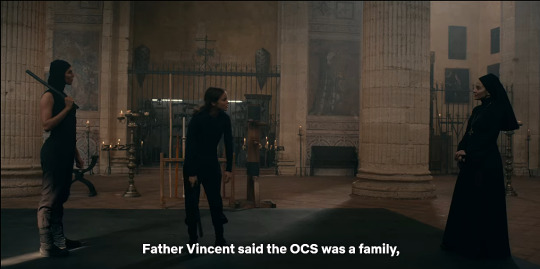
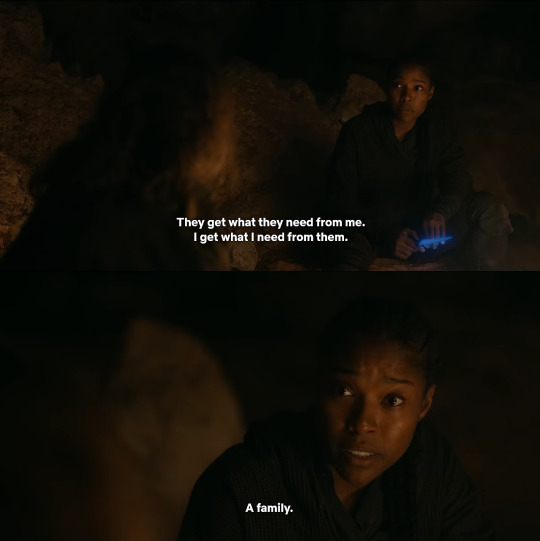


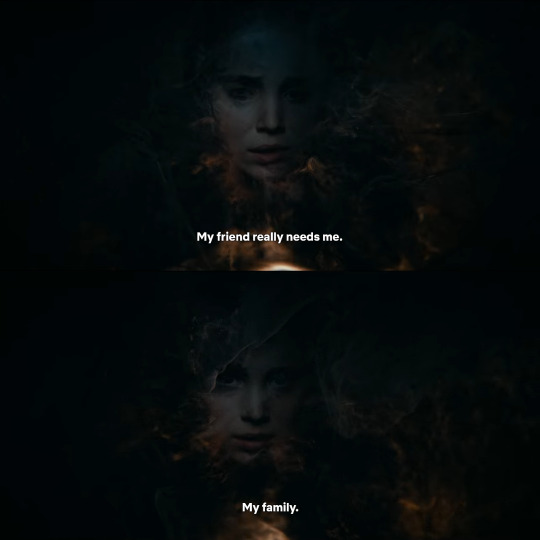

B) The burden
Needless to say that if there is a generous deal of “burden” to Suzanne’s “gift”, there is also some “gift” in Shannon’s “burden”, judging by her mentioning the family she gained through bearing the Halo. Curiously enough, the dynamic of receiving something and paying for it with that very “gift”—Shannon getting a family and losing it by the very same means—is identical to the dynamics involved in getting Ava to accept her fate as warrior nun, by “paying” for the “gift” of life by risking that very same life in battle.
Shannon has received the “gift”—and fulfilled her role to perfection, allowed to thank God for it personally… If the Halo was taken from Suzanne, Shannon is the one “taken” because of it, alongside other ex-bearers.
Here there are no euphemisms. Shannon has lived the consequences of being “God’s champion” until the very end, so she has no need for distorted truths meant to keep things in order, to avoid questioning the principle of order itself which is the institutional view. There is still a struggle (there is always a struggle) as she admits to finding something positive (a family) through her loyalty to the cause even if the cause is what kills her and other women like her. The contrast between Mother Superion’s speech focused on individual responsibility and Shannon’s avowal of how it is “too great for one person to bear” tells us more than enough about how they each envision individuality, community, the possibility of action, who can make it come about—how life and death, different paths, different destinies, inform perception of the same thing.
Their values are inverted.
Mother Superion’s “gift” is Shannon’s “burden”; Mother Superion’s tendency, while alive, to value death (“You fight in His name”) is countered by a dead Shannon’s valorisation of life (“So much promise unfulfilled. So much life unlived. And for what?”) The scenes are in direct opposition to one another, they respond to one another as mirrored images.
So much so that the reply is not merely linguistic, hidden away in dialogue, but quite evidently displayed in visual terms as well. A mirror offers us reflections that are inverted—left in place of right, right as left—and so are these scenes inverted in relation to one another: in the moment of saying the sentences we’re concerned with, Mother Superion and Shannon stand in much the same place. If we do not notice, it is because the camera pans around in different angles—with the former, we watch the scene from a point at Ava's left, while the latter is shown from an angle at her right. We are literally treated to reflected images, seen from opposite points of view.

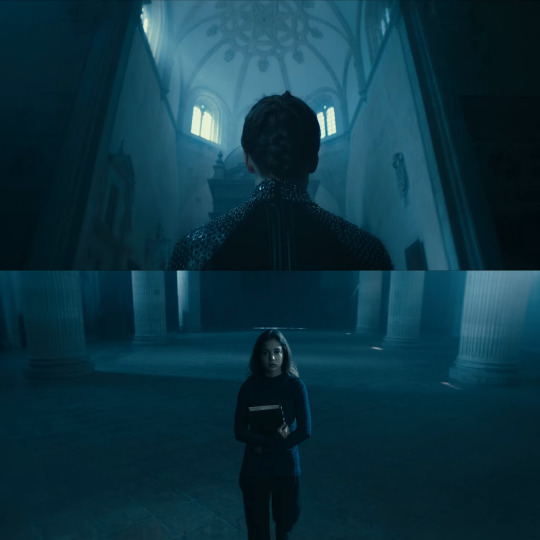
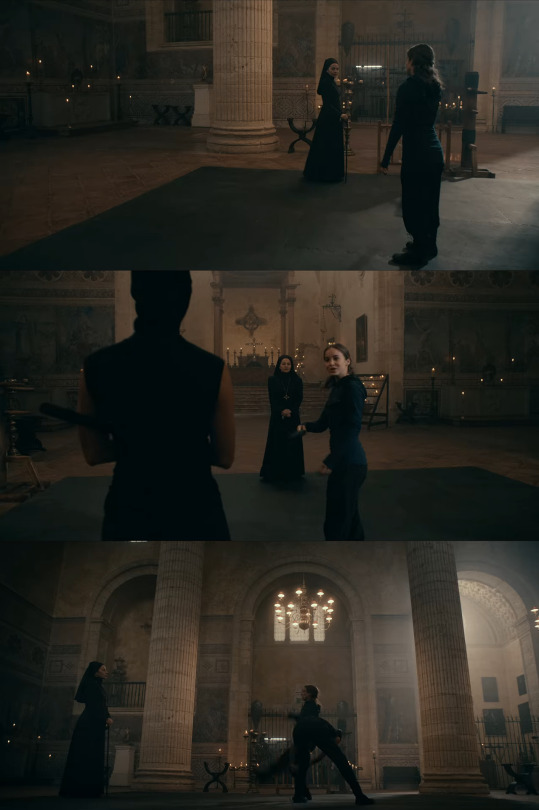
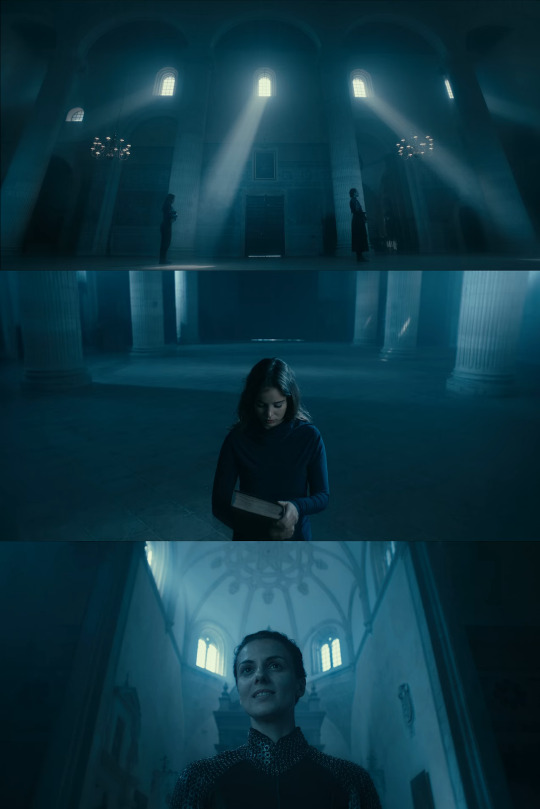
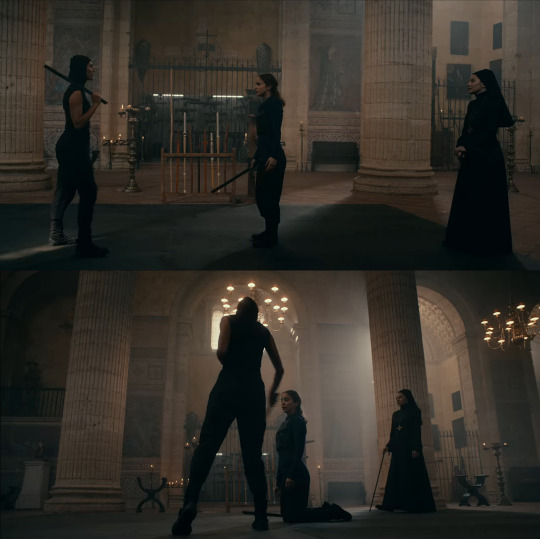
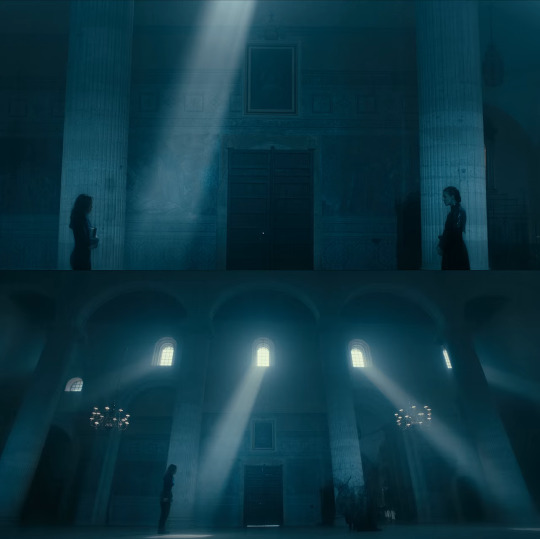
Colour, too, guides our reading of both scenes set side by side. With Mother Superion, we are in the realm of the church and its associated earthly tones as established throughout the first season, whereas Ava’s vision of Shannon paints the dream church in a shade of blue. Blue is, of course, the hue which had been mostly tied to Jillian Salvius, to ArqTech, to science. With science comes the concept of reason, as opposed to the sepia haze of faith.
Mary is also drawn against a backdrop of bright blue sky when she is investigating the docks and relying on her reason rather than her faith concerning Shannon’s death.
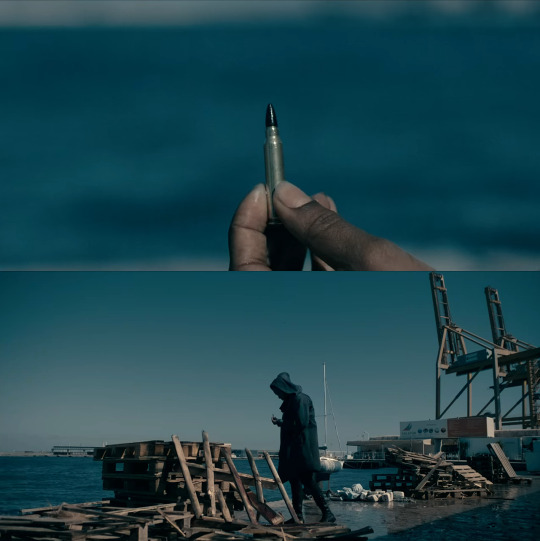
Shannon’s opinion on the Halo might be just as subjective as Mother Superion’s before her, but it is filtered through personal experience and observation, through reason rather than blind belief in a mission.
Yet we are forgetting something. Ava, having died already, claims there is nothing on the other side. If that is so, why is she meeting Shannon now? And why is this meeting taking place in circumstances that reflect previous events in an inverted manner?
As dreams often reuse what we have lived when awake, re-rendering our memories, transforming them, so it is possible that Ava is not having a vision but a dream—that she is talking not to Shannon, but to some facet of herself, Ava, manifesting as Shannon after connecting with her memory through the warrior nun book.
As Ava clings to it and the knowledge it affords her, it would make sense for her conscience to finally figure out a proper retort to what she heard of Mother Superion in that earlier moment, a retort fuelled by new information and by her own reasoning. At the very least, it would be more plausible to consider this hypothesis than to assume her vision of Shannon is a real communication with her spirit granted by the Halo, for, if we are witnessing a new phase of manipulation, then the message being transmitted this time concerns the Halo’s “lifecycle” itself—and how it must be brought to an end. If it is sentient as some characters believe, why would it let Ava meet Shannon and be exposed to the idea of working against the Halo’s own interests of perpetuation?
After all, the implications behind Shannon’s words are evident: again, if the Halo also defines the woman, then it defines sister Shannon, sister Melanie and all other warrior nuns going back to Areala with one word which will soon apply to Ava and whomever follows: that word is dead, crushed under the burden.
And this time, the message, a sort of compassionate provocation (“a burden too great to bear”—even for you), hits its mark, inspiring Ava to end the tradition and be the last warrior nun.
We are not in the semantic field of religion, even if it is there, in the background, being answered to; here we are not speaking of God or battles fought for this distant general in the sky, but of family, of women slaughtered in the name of a mission. This is no longer some ethereal question but an immediate concern. Whether this is Shannon or Ava herself subconsciously masquerading as Shannon to facilitate her own “awakening”, the point gets across now that it is transmitted in language that makes sense to Ava, now that there are common values between speaker and listener.
One could even hypothesise that, at this point, Shannon being a former warrior nun lends credibility to her words in Ava’s mind as she is a woman experienced in this role Ava is supposed to play.
If so, we can also understand the bridge of empathy that is built between Ava and Mother Superion later on when it is revealed that Suzanne, too, was a halo bearer and that she, too, has carried this “burden”. Both forge new understandings of one another through this common background and a personal exchange that is nothing like their first encounter—when the “gift” is said to have rejected the older nun, when its “burden” is divulged to Ava.
As Ava recognises Shannon, so do Ava and Mother Superion eventually recognise one another as well—so do they begin to comprehend how they did carry similar values, only obscured by their dissimilar ideologies and their resulting language use. If no other, then the value of family is what binds them together through Suzanne’s new disposition to embrace all of her sisters and Ava’s newfound conduct in considering them her sisters to begin with. They come closer in the catacombs and, at last, meet halfway by season two.
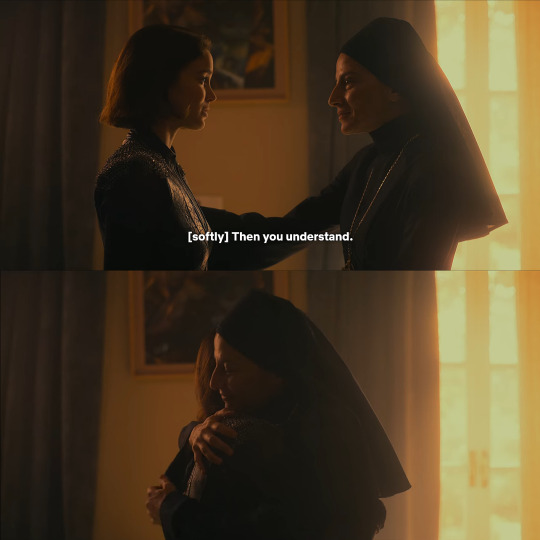
Yet we, the viewers, as touched by this miscommunication that ends well as we may be, after all of this talk of gifts and burdens, we remain none the wiser on what the Halo actually is.
C) The energy source
As previously exposed, we are kept in the dark because most sentences that speak of this iconic object in the series are subjective, focused on the characters’ own relationship to it or their ideas about it rather than any substantial data on what it might truly be apart from a “hunk of magic metal” currently in Ava’s back.
Perhaps because we spend so much time with the nuns, satisfied as they are with the logic of plain belief instead of concerned with tangible, provable things that can or should be explained. The most we get is the information on how the Halo is some kind of weapon, an amplifier attuned to the bearer’s body and soul.


Enter Jillian Salvius.
While her understanding of the Halo is admittedly insufficient, her research on it limited, her available vocabulary and scientific knowledge too slim (!) to encompass such an item, she does not say something like “the Halo is a mystery” or “a conundrum” as she says of Lilith later on. It would be true, just as it being a “gift” or “burden” is true considering those who called it thus, yet Jillian uses another sort of language instead.

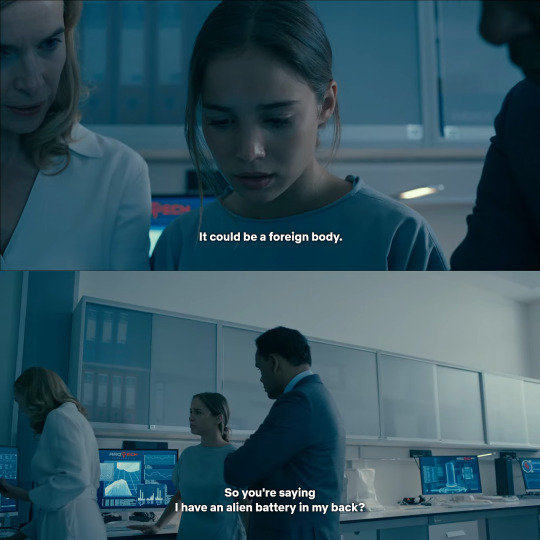
Being a scientist, doctor Salvius opts for what we consider to be appropriate scientific modes of speaking, that is, by creating an impression of objectivity. It is not her personal reaction or opinion of the Halo that she offers, but whatever traits she can see or learn of in that moment: an energy source, an object that defies physics, a foreign body of undefined material. Ava “translates” this as being “an alien battery”, but the fact is that we are served a definition of the Halo unlike those we had before. It isn’t much, but for once we are not given a character’s personal interpretation of it…
Or so it seems. We none of us are capable of being fully objective, for none of us can rid ourselves of our selves—Jillian posits the Halo as an energy source, which seems innocent and impartial enough, but soon afterwards we understand what that means to her.
In themselves, the words “energy source” don’t carry many other connotations. Yet, for Jillian, these words that seem so neutral and “scientific”, so clear cut, do not sustain the facade of objectivity. She has spoken of energy before, it is an active component of her research, a common word in her lexicon; to Ava, “energy source” is “a battery”, but to Kristian and Jillian, who are part of ArqTech, who know what goes on within its walls, these words automatically acquire another meaning.
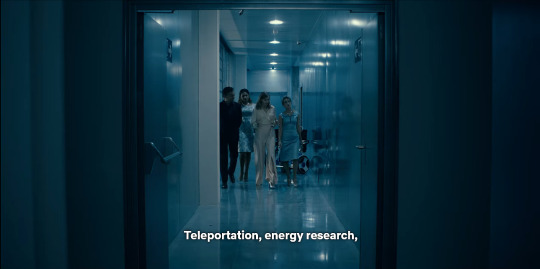

Yes, that of a battery, but one with a very specific purpose. Under the guise of neutral discourse, a very personal interpretation of the Halo, just as if it were a “gift” or “burden”, lies hidden. It is an energy source—one that doctor Salvius can potentially use to power her contraption. It is a “solution”, perhaps even a “gift”, of circumstance if not of god.
And it, too, defines Ava despite herself. When it fails, Jillian says she was wrong about Ava, not the Halo, thus conflating the two.
In the end, even she who might well be the smartest character, the one most closely connected with science and concrete knowledge, cannot guard herself from letting the unsaid (or “unsayable”) slip through her lips. She, too, in spite of her apparent objective language, exhibits a subjective kind of relationship with the world around her, influenced by the ideologies that cross her being.
D) Ending thoughts
Perhaps, when all is said and done, we are never truly able to follow that maxim we’ve seen more than once on Warrior Nun.

Perhaps we simply cannot think or act if we do not perceive things as at least partially related to ourselves.
It is not necessarily a bad thing, though, as long as different views can coexist, as long as they do not trample one another, as long as one person or group don’t elect themselves as the owners of truth, attempting to eliminate all who do not follow them as Adriel tried to do. In a democracy, in a place and a moment in history where there is freedom of thought and creed and speech, the phenomenon of various voices competing for the spotlight, taking turns under it is normal and healthy.
Warrior Nun gives us a fascinating insight on the multiplicity of voices that compose a society, even if there are elements of it which seek to suffocate those voices. It is a microcosm where different ideologies, through language, are confronted with one another, where they struggle to make sense of things—and where each of those points of view over a given subject might carry a morsel of truth. The Halo is a piece of metal and a gift and a burden and an energy source; none of these ideas or perceptions necessarily exclude the other, none is “more correct” than the other because, if so, then the question would be: as regards which character?
To Ava, at least, it is all these things and maybe more.
There are attempts to implant a hegemonic interpretation of facts. The very story of Areala, Adriel, the Halo’s trajectory along the centuries, how this is “the way it has been for one thousand years” is a strategy to cement a singular view. The repetition, the constant reworking of tradition, telling this story over and over with each warrior nun… That is the church at play, ideology trying to fill in any gaps, keep things as they are, conserve them and the structures that organise them, guaranteeing that things have one certain sort of sense and not another, one value, one meaning.
But life is not stagnant and people are not all swallowed whole by ideology even when they subscribe to it willingly, as a member of a church would. There are always things that cannot be explained, things that are beyond the scope of ideology—contradictions, pesky little details that escape the invisible goggles with which we look at reality. The truth is that it is far more complex than we can contain it with a few buzzwords, man-made or divine. There is always another side, always a reply, a constant dialogue between our different ways of seeing, understanding, being and, therefore, speaking.
A more visible example comes from those scenes in season two where Yasmine and Adriel are both telling the exact same story, only through their own perspectives, interpreting it in their own ways.
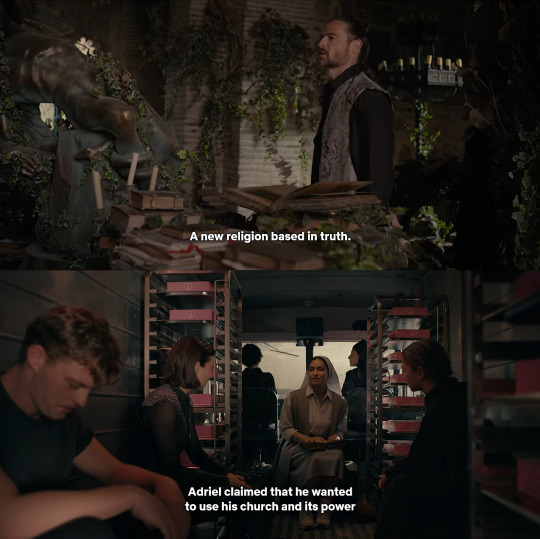

The show provides many opportunities to see how varied human voice can be, how the point of view of whoever is telling the story bears a mighty influence on the narrative, whether consciously or not, malicious or not. That, in turn, may inspire us to look around us, in the real world; to look at how we are representing things, others and even ourselves as well as how others represent us through the words we use.
This is not an exhaustive study, long as it is. As said before, it is but a glance at two scenes, two little lines of dialogue which are, however, intimately connected with others, with the stuff of the entire show—with the stuff of life. We could write more on how possessive pronouns and other sorts of phrases with the idea of the Halo “belonging” to someone or being “owned” by someone are used, just to remain in the area of discourse about the Halo alone.
But the present text has given all it had to give and its author does not wish to be a burden on her readers any more than she already has been.
#warrior nun#mother superion#ava silva#sister shannon#jillian salvius#look i tried my best not to throw jargon at you#it is strange for me to NOT mention bakhtin foucault pêcheux ducrot althusser greimas courtès perelman olbrechts tyteca & co#but the theory is there working beneath the text. i didn't want to scare anyone with the whole academic stuff#so i have tried all i could to use it without mentioning it directly and guarantee that anyone can understand what i've written#you will tell me if i have managed to convey my message or not#i hope i have. i don't like using a word like ideology without defining it but i want to trust in readers' intelligence#anyway. discourse analysis with some semiotics thrown in. i hope you have as much fun with this as i did!#i chose these two moments because i found them pretty cool#but we could talk about how language works in warrior nun for years probably#how it ties everyone together despite differences in understanding how it appears and reappears with new meanings#anyway I'VE SPOKEN ENOUGH#analysis and similar#exercises in observation
136 notes
·
View notes
Note
This is quite a broad question, but how do you define masculinity and femininity?
A set of culturally dictated traits which reflect cultural biases and social dynamics, and are forcibly assigned to men and women (and people perceived as men or women) through social and even institutional pressures.
Femininity and masculinity are in no way innate to women and men respectively, they're categories that exist to reinforce patriarchy, heteronormativity, cissexism, and even less directly associated power structures like white supremacy.
And as a sidenote, I don't think there's anything wrong with identifying with femininity or masculinity - they're all just collections of traits and there are positive and negative and neutral traits in both categories (though generally more negative feminine traits for the reasons described above lol.)
But I think that in an ideal world masculinity and femininity would not be coherent categories of traits, even if men and women are still coherent categories of people, and I think trying to redefine or reinterpret femininity or masculinity more positively rather than interrogating the reasons traits like passivity or objectification or irrationality are considered feminine and traits like anger, dominance, and violence are considered masculine misses the point. It's much more valuable to fight against gender essentialism and dismantle the categories of masculinity and femininity entirely than to attempt to redefine these categories positively while still associating them with men and women imo.
But also since we don't live in that ideal world it remains useful and interesting to analyse the portrayals of masculinity and femininity in media, and as a gender nonconformity enthusiast it's one of my favourite things to do lol
Thanks for the ask! It's always good to actually define terms, especially politically loaded terms like these.
#lol like yes freudian film theory is gender essentialist as hell yes it's incredibly fun and rewarding#the trick is to understand it's all bullshit. then you can have fun with it#ask#anonymous#a#b#theme: themes#theme: misogyny#i had this queued but i just saw a post that annoyed me by implicitly defining masculine and feminine in a gender essentialist#way so i'm posting this now instead of tomorrow
23 notes
·
View notes
Text
some feminists are really attached to a quasi religious belief in matriarchies having existed in some very distant past that we conveniently can’t know much or anything about, not because they feel inspired by the idea of women being political and religious leaders and 1st class citizens but because they feel comforted by the idea of men being socialized to be peaceable women respecting citizens bc that would mean men aren’t inherently bad and they are right to continue pouring energy into saving men from themselves
#i don't believe in the existence of matriarchies the way 2nd wave feminists defined them and i also don't believe#that the hypothetical existence of 1 or 2 matriarchies in all of human history would prove the socialization theory and that we#shouldnt give up on men bc they can be good or something
240 notes
·
View notes
Text
Y'know I'm pretty sure obsessively thinking about a lego cartoon all day every day for over a decade to the point that it's a key part of your entire personality and one of the first things people know about you is just. Not a very allistic thing to do. Y'know? You understand me?
#mom it's been a DECADE#a DECADE of me doing this#but noooo I can't be autistic because I'm not exactly like my cousins or whatever she thinks autism has to look like 🙄#and I HAVE other traits!! I do!! but those are written off as just annoying habits or personal failures on my part!!#she KNOWS how much I like this show. she's been THERE for my incessant ramblings and half-baked theories#she's been THERE for my piles and piles of fanart that all started with a silly doodle of Lloyd#she's SEEN me turn everything intonan excuse to talk about Ninjago!! it's a running joke with people who know me!! it's a whole thing!!#it's one of my defining traits!!!!!#fuckin hell man!!#sorry for the rant on main lol#autism#autistic#ninjago
23 notes
·
View notes
Note
I've read your pinned post and wanted to say something, as a white girl but also a South European: the "homestead" term is historically bounded to white supremacy, yes, but only in those countries of the Western world that actively participated in colonialism and built their economic fortune on slavery.
I'm a contemporary history graduate and I can assure you NOT ALL OF WESTERN WHITE COUNTRIES WERE INVOLVED IN COLONIALISM. Go ask a Hungarian, a Moldovian, an Albanian if their grandparents were white suprematists because they owned a homestead and they will laugh.
Also, some European peoples were themselves victims of colonialism. So please please please when you all talk about specific historic issues consider learning how to divide nowadays political discourse from actual historic work.
"Fancy" political discourse has most of the time nothing to do with serious historic researches (at least, in European universities; I cannot speak for the level of academia in the US...).
I am also a history graduate student at a european university, but thank you for this ask anyway. I don't disagree with your general point-- that colonialism is not a strictly racial divide with white people being the colonizing party and all non white people the colonized. Like that's definitely true. When speaking about the term homestead, i am discussing it as a white supremacist dogwhistle, not saying that anyone who grows their own food is a racist. i would expect that the words agrarian subsistence farmers in hungary, moldova and albania used to describe their homes and their lifestyles would not be "homestead" because it is, an english word.
Consider also that this is a tumblr aesthetic blog and not a historical research conference, where the focus of discussion is, in fact the "fancy" (whatever that means in this context) political discourse which pervades the space and has pervaded it historically.
I'm sure as a student of contemporary history you would understand the historical connections between colonialism, white supremacy, and "blood and soil" rhetoric which used the visuals and languages of pastoralism. this is what i am referring to when i say that homestead is used as a dogwhistle.
also, the idea that a country or a people being subjects of colonialism means they cannot also, at the same or another time, be the perpetrators (or beneficiaries) of it is laughable. i would say that yes, EVERY western white country was involved in colonialism, to varying degrees, at the same time that some are/were subjects of it.
my apologies if this response was disorganized; but i found your assertion that political discourse (which i take from context here to be discussions of the current effects and manifestations of colonialism) not only is but should be largely divorced from serious historical study to be misguided at best. In fact I find it difficult to think of an example wherein the discussions are unrelated.
#i am unsure how you are defining 'real serious historical work'#such that is precludes discussion of the major political economic and philosophical underpinnings of the last four centuries#rosa mail#cw discussion of racism#im not an expert on post colonial theory or anything but... ??#anyway if ive ever ignored ur ask its because when i answer one i immediately get eight more lol
25 notes
·
View notes